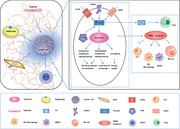- Record: found
- Abstract: found
- Article: found
Lipid metabolism in cancer progression and therapeutic strategies

Read this article at
Abstract
Dysregulated lipid metabolism represents an important metabolic alteration in cancer. Fatty acids, cholesterol, and phospholipid are the three most prevalent lipids that act as energy producers, signaling molecules, and source material for the biogenesis of cell membranes. The enhanced synthesis, storage, and uptake of lipids contribute to cancer progression. The rewiring of lipid metabolism in cancer has been linked to the activation of oncogenic signaling pathways and cross talk with the tumor microenvironment. The resulting activity favors the survival and proliferation of tumor cells in the harsh conditions within the tumor. Lipid metabolism also plays a vital role in tumor immunogenicity via effects on the function of the noncancer cells within the tumor microenvironment, especially immune‐associated cells. Targeting altered lipid metabolism pathways has shown potential as a promising anticancer therapy. Here, we review recent evidence implicating the contribution of lipid metabolic reprogramming in cancer to cancer progression, and discuss the molecular mechanisms underlying lipid metabolism rewiring in cancer, and potential therapeutic strategies directed toward lipid metabolism in cancer. This review sheds new light to fully understanding of the role of lipid metabolic reprogramming in the context of cancer and provides valuable clues on therapeutic strategies targeting lipid metabolism in cancer.
Abstract
Lipid metabolic reprogramming‐mediated crosstalk between cancer cells and tumor microenvironment contributes to cancer progression. Stromal cells, such as adipocyte, CAF, epithelia cells contribute to lipid metabolic reprogramming in cancer cells. Cancer cells undergo lipid metabolism rewiring to generate building materials for membrane, lipid second messenger and energy supply. Cancer cells can also secret lipid metabolites to affect immune cell functions, creating a tumor‐favoring immune microenvironment.
Related collections
Most cited references331
- Record: found
- Abstract: found
- Article: not found
Global Cancer Statistics 2018: GLOBOCAN Estimates of Incidence and Mortality Worldwide for 36 Cancers in 185 Countries
- Record: found
- Abstract: found
- Article: found
